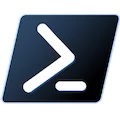PowerShell is a command-line shell and scripting environment that extends the functionality of the Windows Command Prompt and Windows Script Host. It allows command-line users and script writers to harness the power of the .NET Framework for system administration and automation tasks. PowerShell also provides convenient remote management and detailed administrative features. Friends who like PowerShell are welcome to download and experience it!
PowerShell Highlights
Script Editor: Powerful, featuring syntax coloring, reference highlighting, bookmarks, code formatting, and code completion. It also allows users to create, edit, and manage code snippets, as well as scripts containing cmdlets from remote modules.
Function Builder: Helps users easily create advanced functions, including cmdlets and parameter attributes, along with comment-based help. The Function Builder inserts the correct syntax for the user.
GUI Designer: An enhanced form designer makes GUI design quick and simple, without the need to write extensive code manually. Advanced GUIs can be created using pre-wired controls.
PowerShell Features
Full-featured Windows PowerShell editor.
Create PowerShell GUI tools visually.
Convert scripts into executable files (.exe).
Create MSI installers.
Create modules from existing functions or help files.
Create advanced functions using the Function Builder.
Monitor script performance and memory usage.
Script using cmdlets from remote computers.
Source control integration.
Integrated PowerShell console (32-bit and 64-bit).
Comprehensive script debugger.
Remote debugging.
Multi-file and module debugging.
Code formatting capabilities.
PowerShell Functions
Script Debugger: Supports running and debugging scripts and entire modules locally and remotely. Quickly debug, fix, and verify any issues encountered, with support for conditional breakpoints.
Multi-Platform Support: Supports both 32-bit and 64-bit versions of PowerShell within a single application, allowing scripts to be run with elevated privileges and in STA/MTA modes.
Create Executables and Installers: Convert scripts into executable files (.exe), create MSI installers, and fine-tune custom access permissions, elevation, and platform targeting.
Create Modules: Quickly create Windows PowerShell script modules by selecting from existing functions.
Performance Monitor: Displays real-time memory and CPU usage to track script performance, showing the results of recent sessions side-by-side.
Editor Console: The integrated Windows PowerShell console allows switching between 32-bit and 64-bit modes while maintaining the session.
Projects: Use projects to manage multi-file scripts, create multi-form GUIs, and script modules.
Source Control: Integrated source control connection for backing up and versioning files, preventing loss of work.
Browsers: Provides browsers for editor commands, functions, WMI objects, .NET objects, and databases.
New Cmdlets: Introduces multiple built-in cmdlets for performing computer-related, event log, and performance counter management tasks.
Script Internationalization: Enables Windows PowerShell scripts to display messages in the spoken language specified by the UI culture settings on the user's computer.
Advanced Functions: Advanced functions have the same capabilities and behavior as cmdlets but are written entirely in the Windows PowerShell language.
Modules: Allow script developers and administrators to partition and organize their Windows PowerShell code into independent, reusable units.
PowerShell FAQ
Version Compatibility Issues
Problem Description: PowerShell has multiple versions, and there may be differences between them. If your script or command works in one version but not in another, it might be a version compatibility issue.
Solution: Try upgrading or downgrading the PowerShell version to ensure compatibility with your code.
Permission Issues
Problem Description: Certain PowerShell commands require administrator privileges to execute. If you encounter permission errors or access denied messages, it might be due to insufficient permissions.
Solution:
Run PowerShell as Administrator: Right-click the PowerShell icon and select "Run as Administrator".
Check Script Permissions: Ensure the script file has the appropriate permissions. You can view file permissions using the `Get-Acl` command and modify them using the `Set-Acl` command.
